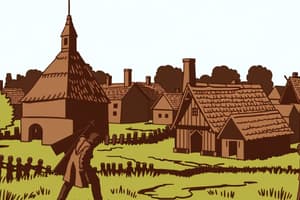Podcast
Questions and Answers
During which centuries was medical training provided in Hippo?
During which centuries was medical training provided in Hippo?
- 4th century BC to 5th century AD
- 3rd century BC to 5th century BC
- 4th century to 5th century (correct)
- 6th century BC to 3rd century AD
The practice of medicine in Algeria during the colonial period was essentially naturalistic.
The practice of medicine in Algeria during the colonial period was essentially naturalistic.
True (A)
Who discovered the malarial hematozoan in 1880 at the Constantine hospital?
Who discovered the malarial hematozoan in 1880 at the Constantine hospital?
Doctor A.Laveran
The first woman doctor in Africa, Aldjia Benallegue-Nourredine, was born in Kabylie in _____.
The first woman doctor in Africa, Aldjia Benallegue-Nourredine, was born in Kabylie in _____.
Match the medical practice with the corresponding period:
Match the medical practice with the corresponding period:
When was Dr. Mounia AMIAR elected foreign corresponding member of the French National Academy of Medicine?
When was Dr. Mounia AMIAR elected foreign corresponding member of the French National Academy of Medicine?
Who was the first professor of Radiology in independent Algeria?
Who was the first professor of Radiology in independent Algeria?
In 1971, the Faculty of Medicine disappeared and was replaced by an Institute of Medical Sciences (ISM) under the supervision of the National Institute of Higher Studies in Medical Sciences (INESSM), which brought together the three institutes of medicine, pharmacy, and dental surgery. The reduction in the number of years of study to __ and the abolition of the internship, replaced by a three-year residency.
In 1971, the Faculty of Medicine disappeared and was replaced by an Institute of Medical Sciences (ISM) under the supervision of the National Institute of Higher Studies in Medical Sciences (INESSM), which brought together the three institutes of medicine, pharmacy, and dental surgery. The reduction in the number of years of study to __ and the abolition of the internship, replaced by a three-year residency.
Match the following individuals with their roles during the colonial period in Algeria:
Match the following individuals with their roles during the colonial period in Algeria:
Study Notes
Medical Practice in Algeria during the Colonial Period
Introduction
- Algeria has a long history of medical practice, dating back to the Numidians in the 3rd century BC
- The Numidians were known for their longevity and built the kingdom of Numidia
- Medical training was provided in Hippo from the 4th to the 5th century and lasted for 5 years, including theoretical and practical components
Medical Practice before 1830
- Arabs introduced Islam in North Africa in the 7th century, influencing medicine
- Physicians drew inspiration from the Koran and Sunah, establishing a naturalistic medicine focused on hygiene and prophylactic measures
- Medical education was provided in medersas (universities) and financed by habous (waqf)
- Notable hospitals were built, including one in Tlemcen and another in Bejaïa, staffed by qualified naturalists, nurses, and pharmacists
The Army Health Service in Algeria
- French colonization lasted 130 years and can be divided into two phases: "Heal to Conquer!" and medicine as a tool for marginalizing the native population
- Medical officers dealt with endemic diseases and epidemics, with military hospitals open to civil servants, settlers, and natives
- The Dey hospital in Algiers was established in 1830, followed by hospitals in Guelma and Constantine
- The Mustapha Pacha civil hospital was inaugurated in 1854, with a medical course organized in 1855
Development of Tropical Medicine
- Malaria was a significant concern, with doctors F.C. Maillot and A. Laveran making significant contributions to the fight against the disease
- Laveran discovered the malarial hematozoan in 1880 and was awarded the Nobel Prize for Physiology and Medicine in 1907
- The Institut Pasteur in Algiers was founded in 1894 to combat malaria
Attempts to Train Indigenous Medical Personnel
- The Catholic Church's attempt: Cardinal Archbishop Lavigerie co-founded the Hôpital Sainte-Elisabeth des Attafs in 1874
- The General Government's attempt: General Chanzy created the Arab offices to administer the indigenous population
- The corps of indigenous paramedics was created in 1901, recruiting medersa graduates to work alongside colonial physicians
The Interwar Period (1920-1940)
- The colonization medical service was placed under the authority of the Governor General in 1920
- The Institute of Hygiene and Colonial Medicine was created at the Faculty of Medicine in Algiers in 1923
- Auxiliary hospitals were replaced with consultation rooms and first-aid ophthalmological dispensaries
The Second World War and Independence
- The Colonization Medical Service reached its peak in 1939, with 112 medical districts
- The Algerian Medical Corps was created in 1944, including former colonial physicians
- The first Muslim doctors during the colonial period included Doctor Mohamed Benlarbey and Doctor Aldjia Benallegue-Nourredine
Medical Practice in the Maquis (1954-1962)
- Doctor Mohamed Messaoud Bendib was a professor of Radiology and called for a strike by Algerian students at the University
- Several doctors joined the maquis and the ALN, occupying important positions
The Post-World War II Period
- Insecurity forced health service personnel to restrict their activities during this period
- Military doctors took over from civilian doctors in the boondocks
Studying That Suits You
Use AI to generate personalized quizzes and flashcards to suit your learning preferences.
Description
This quiz explores the history of medical practice in Algeria during the colonial period, covering aspects of forensic medicine, medical law, and ethics.




